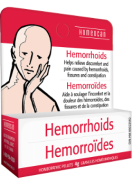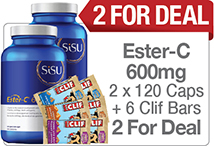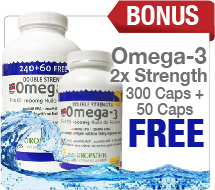Varicose Veins
How To Manage Varicose Veins
Varicose Veins are enlarged, twisted, and swollen veins that typically occur in the legs and can be seen just beneath the skin's surface. They are a common condition affecting millions of people worldwide. Varicose veins are usually blue or purple in colour and they can be painful and unsightly. Read more >-
 Homeocan’s Hemorrhoids homeopathic pellets are specially and naturally formulated to relieve discomfort and associated pain (fissures and constipation). A hemorrhoid is a varicose swelling formed by the dilation of a vein in the anus and rectum. Its cause is often linked to blood circulation and poor nutrition. The pellets consist in r...Homeocan’s Hemorrhoids homeopathic pellets are specially and naturally formulated to relieve discomfort and associated pain (fissures and constipation). A hemorrhoid is a varicose swelling formed by the dilation of a vein in the anus and rectum. Its cause is often linked to blood circulation and poor nutrition. The pellets consist in reducing swelling in the rectum and alleviating the feeling of itching. Easy to carry everywhere, this tube of pellets is equipped with a very practical format. Hemorrhoids are caused by increased pressure in the area and a weakening of the vessel walls. These effects can be caused by constipation, poor diet, obesity, hormonal changes (like those in pregnancy) and prolonged periods of sitting or standing. [PELLETS]+ Earn 7 Reward Points
Homeocan’s Hemorrhoids homeopathic pellets are specially and naturally formulated to relieve discomfort and associated pain (fissures and constipation). A hemorrhoid is a varicose swelling formed by the dilation of a vein in the anus and rectum. Its cause is often linked to blood circulation and poor nutrition. The pellets consist in r...Homeocan’s Hemorrhoids homeopathic pellets are specially and naturally formulated to relieve discomfort and associated pain (fissures and constipation). A hemorrhoid is a varicose swelling formed by the dilation of a vein in the anus and rectum. Its cause is often linked to blood circulation and poor nutrition. The pellets consist in reducing swelling in the rectum and alleviating the feeling of itching. Easy to carry everywhere, this tube of pellets is equipped with a very practical format. Hemorrhoids are caused by increased pressure in the area and a weakening of the vessel walls. These effects can be caused by constipation, poor diet, obesity, hormonal changes (like those in pregnancy) and prolonged periods of sitting or standing. [PELLETS]+ Earn 7 Reward PointsSale: $7.49
Reg.: $8.14 (Save $0.65)
In Stock
When To Worry About Varicose Veins?
Varicose veins are enlarged, twisted, and swollen veins that typically occur in the legs and can be seen just beneath the skin's surface. They are a common condition affecting millions of people worldwide. Varicose veins are usually blue or purple in colour and they can be painful and unsightly. So, when should you worry about varicose veins? While they don't pose a health concern per se, they can be painful and unsightly and may be present due to poor circulation.
Several factors contribute to the development of varicose veins. Understanding the various causes is crucial for prevention and management strategies to maintain vascular health and reduce the risk of developing varicose veins.
One of the primary causes is genetics; individuals with a family history of varicose veins are at a higher risk of developing them themselves. Age also plays a significant role, as the natural wear and tear on vein valves can lead to dysfunction over time. Prolonged standing or sitting in one position can hinder blood flow and increase pressure in the veins, making them more susceptible to varicosities. Hormonal changes, such as those during pregnancy or menopause, can weaken vein walls and contribute to the condition. Obesity and excess body weight can put additional pressure on leg veins, exacerbating the problem. Lastly, gender, with women being more commonly affected than men due to hormonal fluctuations and the use of birth control pills.
How to Prevent & Manage Varicose Veins
While you may not need to worry too much about varicose veins causing further health issues, most people like to avoid them. It may not be possible to completely prevent varicose veins, but lifestyle changes and strategies can help reduce your risk or alleviate symptoms.
Regular Exercise – Regular physical activity helps improve circulation and strengthen leg muscles, which can support healthy vein function.
Maintain a Healthy Weight – Maintaining a healthy weight reduces the pressure on your leg veins and lowers your risk of developing varicose veins.
Elevate Your Legs – Elevating your legs when resting can help improve blood flow back to your heart and reduce the strain on your veins.
Avoid Prolonged Sitting or Standing – If your job requires long periods of sitting or standing, try to take breaks and move around regularly to promote blood circulation.
Compression Stockings – Graduated compression stockings can help by applying pressure to the legs, aiding blood flow. Please consult a healthcare professional before using them.
In addition, dietary supplements can be a valuable addition to healthy lifestyle hygiene, improve circulatory health, and help you manage varicose veins.
Supplements For Varicose Veins
Several supplements can aid in the prevention and treatment of varicose veins, each with varying forms and dosages. Horse chestnut extract, available in capsules or topical creams, is a popular and widely studied choice, with recommended dosages typically ranging from 300 to 600mg daily.
- Diosmin and hesperidin, often found together in supplements, can be taken in doses of 450-900mg and 50-100mg to improve vein health.
- Grape seed extract, available in tablet or capsule form, is recommended at doses of 100-300mg daily to strengthen blood vessels.
- Vitamin C, known for its collagen-boosting properties, can be taken in doses of 500-1000mg daily to support overall vascular health.
Plus, many other combination supplements can effectively promote veinous health and help prevent varicose veins from worsening so you don't have to worry about the pain they can cause. Some of the most reputable formulas include:
- CircuVein, from Flora
- Feminex Healthy Legs, from Adrien Gagnon
- Varitone, from Provita
- Veinease, by AOR
- Vein Tonic, from St-Francis Herb Farm
Things To Consider When Taking Supplements For Circulation
While very effective and mostly well tolerated, individuals occasionally experience gastrointestinal discomforts, such as nausea or diarrhea, when taking supplements for circulatory health. Also, ingredients like garlic or fish oil, can thin the blood, potentially increasing the risk of bleeding, particularly when combined with blood-thinning medications. Individuals with bleeding disorders or those scheduled for surgery should exercise caution and consult their healthcare provider before starting such supplements.
Back to Top ↑





















